Working Mens’ Clubs in Twickenham and surrounding areas had been meeting each other for friendly competitions since the early 1870s. These would typically involve some combination of activities such as chess, draughts, whist, cribbage, dominoes and bagatelle.
Twickenham Chess Club, for its first few years, seemed to content itself with internal handicap tournaments along with the occasional simultaneous display. It wasn’t until January 1883 that they played their first match against another club. This was against Isleworth Reading Room Chess Club (there has been no chess club in Isleworth for many decades) and resulted in a victory for Twickenham 9 points to 3. Hurrah!
The following month, Twickenham visited Isleworth for a return encounter over 9 boards, with each player having two games against the same opponent. Here’s what happened.
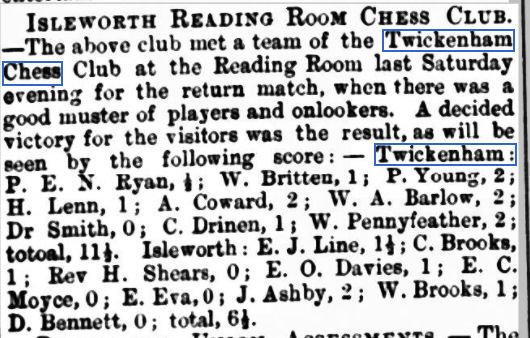
You’ll notice George Edward Norwood Ryan and Wallace Britten on the top two boards. Some of the initials are, as was common in those days, incorrect.
Buoyed by their success, in March they entertained Kingston Chess Club. The Surrey Comet reported that the Twickenham players were most successful, beating their opponents all along the line.
It seems that the Twickenham Chess Club had rapidly established itself as one of the stronger suburban clubs, and that the top boards must have been pretty useful players. As yet I haven’t been able to find any of their games.
It wasn’t until 1884 that we have a record of another match, again versus the Isleworth Reading Room Chess Club.
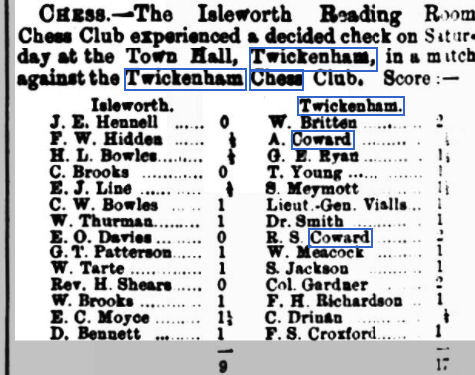
There are several interesting names here, but you’ll spot two Cowards in the team. Following his successes the previous year, A Coward had been promoted to second board. The two Brittens turned out not to be related to each other, or to their musical namesake. What about the two Cowards?
First of all, the weaker Coward’s middle initial is incorrect. They were in fact brothers: Arthur Sabin Coward and Randulph Lewis Coward.
In the 1881 census the family were at 4 Amyand Park Road, Twickenham, right by the station. Arthur was 24 and Randulph 20, both were working as clerks, and they were living with their widowed mother, an annuitant (pensioner), five younger sisters and a servant.
Their late father, James Coward, a victim of tuberculosis the previous year, had been an organist and composer (spoiler alert: not the only organist and composer we’ll encounter in this series)
It’s well worth looking at all his children.
- James Munro Coward was, like his father, an organist and composer, but his musical career was marred by heavy drinking.
- Walter Coward, a singer, became a gentleman-in-ordinary at the Chapel Royal, St James’s Palace and librarian of the Chapel Royal’s music.
- Arthur Sabin Coward – we’ll return to him later.
- Gordon Leslie Coward is something of a mystery. He joined the army, reaching the rank of Sergeant, but then turned up in New Zealand in 1888, being sentenced to 9 months imprisonment for passing a forged cheque. His lawyer described him as ‘a man of good connections’ who had ‘unfortunately given way to drink’. The probation officer’s report was not favourable. After that, we don’t know. There was a death recorded in Wellington in 1894 of a Gordon Leslie Card, who may or may not have been the same person.
- Randulph Lewis Coward – again we’ll return to him later.
- Hilda Janet Coward followed her father into music, being the possesor of a ‘well-trained voice of extraordinary compass’. Jenny Lind had been known as the Swedish Nightingale (there used to be a pub in Hampton Hill named after her): Hilda was known as the Teddington Nightingale. It seems she stopped performing very suddenly in 1892, and, apart from attending the wedding of her sister Ida three years later, disappeared from view. A few years later she moved to Italy because of a throat infection and died there in 1907.
- Eleanor Jane Charlotte Frances Coward married twice, the first time to Walter’s brother-in-law, had three children and lived a long life.
- Myrrha Coward married a civil servant and lived in Teddington.
- Percy Oswald Coward was a singer: like his big brother Walter a male alto more than half a century before the great Alfred Deller repopularised a voice type which had been neglected since the early 18th century. He moved to Canada, and then, deserting his pianist wife and daughter, to Australia, where he died in 1933.
- Ida Beatrice Coward ran a hotel in Kensington after being widowed at an early age.
- Harold Edgar Coward died in infancy.
A few days after this Isleworth match, the results of the season’s handicap tournament were in.
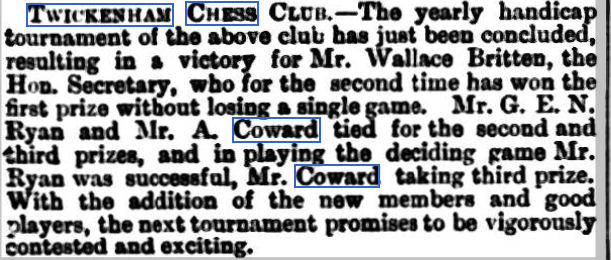
Confirmation, then, that Arthur Coward was, along with Wallace Britten and George Ryan, one of the strongest members of Twickenham Chess Club.
With Artie and his brother Randy still young men in their twenties, a great chess future might have been predicted for them. Alas, this was not the case, although they did continue playing for another year or two.
Life, in the shape of family, work and other interests, I suppose, gets in the way.
Let’s visit Teddington and find out.
If you take a stroll along Teddington High Street heading in the direction of the river, you’ll come across two churches. Immediately in front of you, a left turn into Manor Road will take you to Twickenham, while turning right into Broom Road will take you to Kingston. Straight ahead is Ferry Road (another spoiler alert: you’ll be meeting some residents in another Minor Piece), leading to the footbridges across the Thames.
On your left is the quaint 16th century church of St Mary, and on your right a massive edifice which opened its doors in 1889.
Enter Francis Leith Boyd. Boyd, born in Canada, became Vicar of Teddington in 1884 at the age of 28. He was a man of considerable ambition and grandiose ideas, and also famed for his hellfire sermons. St Mary’s wasn’t big enough for him, so he commissioned architect William Niven (grandfather of David) to design a much larger building across the road. It was dedicated to St Alban, but known informally as the Cathedral of the Thames Valley. The money ran out before it was completed: the nave is shorter than intended and the planned 200 foot tower was never built.
Teddington’s new vicar also enjoyed music, and the combination of music and theatricality must have been very appealing to the musical and theatric Coward family. At some point in the late 1880s they moved from Twickenham to Coleshill Road, Teddington, close to Bushy House, where the National Physical Laboratory would be established in 1900, and threw themselves into musical life at the new church of St Alban’s. Artie and Randy were both very much part of this, and, I suppose, now had no time to pursue their chess careers. The family could even provide a full vocal quartet, with Hilda singing soprano, Walter, later replaced by Percy, singing alto, Arthur singing tenor and Randulph singing bass. They performed everything from the sublime to the ridiculous: Bach’s St John Passion, Spohr’s now forgotten oratorio The Last Judgement, Gilbert and Sullivan operettas and the popular songs and parlour ballads of the day.
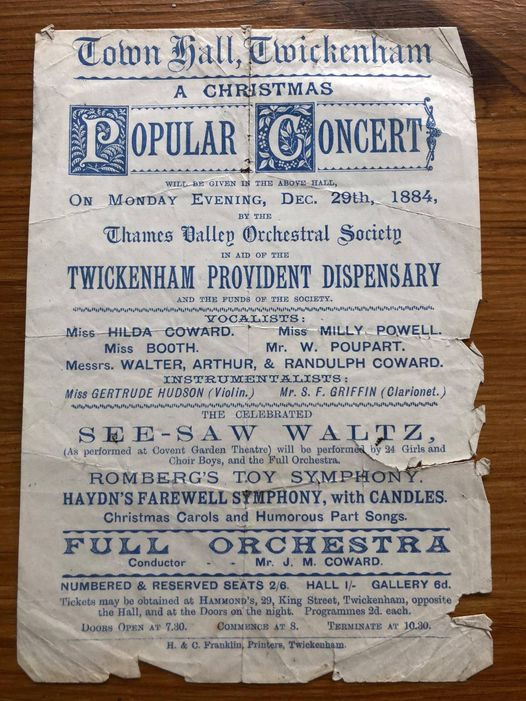
Here they are in Twickenham Town Hall, where they would also have played chess, in 1894, with big brother James conducting. (Mr William Poupart is also interesting: he and his family were prominent market gardeners in Twickenham, but none of them, as far as I know, played chess.)
In 1967 the parishioners of Teddington moved back across the road to St Mary’s and St Alban’s soon fell into disrepair. A campaign spearheaded by local Labour Councillor Jean Brown (in the days when this part of the world had Labour Councillors) fought successfully to save the building for community use. It’s still owned by the Church of England but known as the Landmark Arts Centre. If you visit there now you’ll see a plaque commemorating Jean Rosina Brown in the foyer, and there are some information boards at the back which include press cuttings about the Coward family’s involvement with the church. Some 90 years or so ago, Jean and my mother were best friends at school, so, in her memory, I often attend concerts there.
One of the orchestras playing there regularly is the Thames Philharmonia, whose Chair (and one of their clarinettists) Mike Adams is a former member of Guildford Chess Club. It was good to talk to him during the interval of their most recent concert.
Returning to the Teddington Cowards, in the last few months of 1890 there was both happy and sad news for Arthur.

On 8 October he married Violet Agnes Veitch at St Alban’s Church. Randulph was there as a witness, and, of course, Francis Leith Boyd was on hand to perform the ceremony. At this point he was still, at the age of 34, just a clerk working for a music publisher in London.
Violet came from a prominent Scottish family and may or may not have been related to the endgame study composer and player Walter Veitch (1923-2004), who had a Scottish father and was at one time a member of Richmond (& Twickenham) Chess Club.
A couple of months later, his mother, Janet, died, and when the census enumerator called round the following year he found Randulph, a clerk in the Civil Service there together with his sisters Hilda, Myrrha and Ida. Arthur and Violet had bought their own place in Waldegrave Road, not very far away, and were living there with a domestic servant. Later the same year, their first child was born, a son named Russell Arthur Blackmore Coward. His third name was in honour of his godfather Richard Doddridge Blackmore, a successful novelist (Lorna Doone) and unsuccessful market gardener, who lived nearby. Blackmore was also a more than competent chess player and one can imagine that he and Arthur must have spent many evenings together over the board.
Young Russell showed promising musical talent, but tragedy would strike his family and he died at the age of only 6 in 1898.
The following year another son was born, and it wasn’t long before he made the local papers.
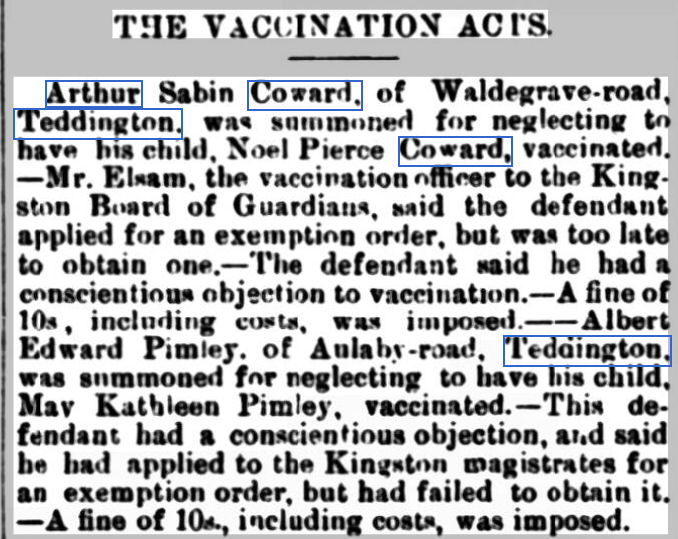
Yes, Arthur Sabin Coward was we’d now call an anti-vaxxer, with a ‘conscientious objection to vaccination’, whatever that might mean. You might have thought that, having lost his first son, he might be only too keen to protect young Noël’s health.
And, yes, you read it correctly – or almost correctly (his middle name was Peirce, not Pierce). The Teddington Cowards were not only related to each other, but also to the great playwright, songwriter, singer and much else, the Master himself, Sir Noël Coward. Arthur was his father and Randulph his uncle.
Of course what you all really want to know is whether Noël inherited his father’s interest in chess. He’s not mentioned in The (Even More) Complete Chess Addict, but Goldenhurst, his Kent residence, had a games room with a chess table. The pieces were always set up ready for play. So perhaps he did. I’d like to think so.
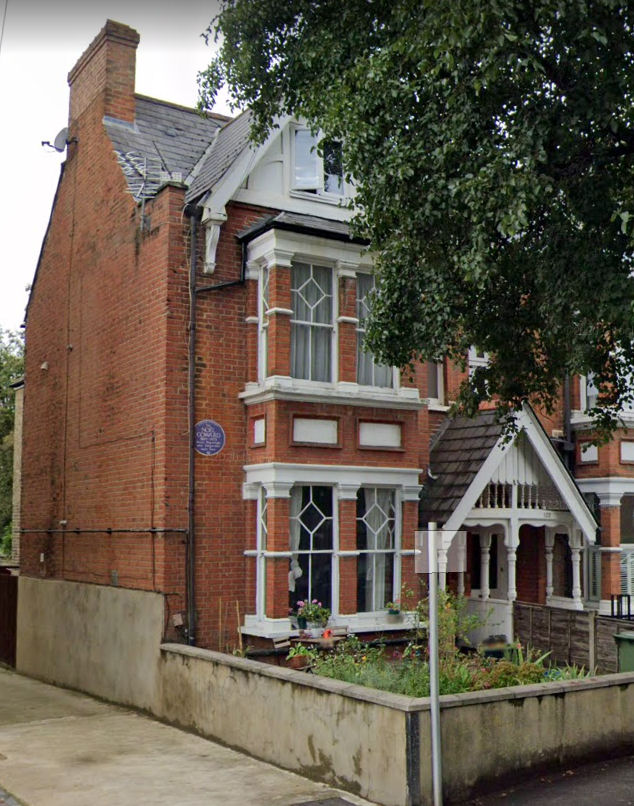
The 1901 census found the family still in Waldegrave Road, and Arthur still in the same job. If you visit now, you’ll find a blue plaque on the wall (see photo above), and if you walk down the road towards Teddington, you’ll be able to meet Sampson Low, the current Richmond & Twickenham Chess Club secretary, who lives not too many doors away in the same road. Randulph, 40, still a bachelor and a clerk in the War Office, was boarding with a family named Russell (perhaps friends of the Cowards) very near St Alban’s Church.
Arthur and his family soon moved to Teddington, first to Sutton, where their third son, Eric was born, and then to a mansion flat near Battersea Park, which is where the 1911 census found him. He’d finally been promoted – to a piano salesman, a role in which he was apparently not very successful. Noël would always be embarrassed by his father’s lack of success and ambition, which may well have been caused in part by an over fondness for alcohol, a trait he shared with several of his siblings.
Randulph was a lot more successful. He finally married in 1905 and by 1911 he was a 1st class assistant accountant at the War Office, living in some luxury in St George’s Square, Pimlico. In 1920, he’d be awarded the MBE for his War Office work during the First World War.
So there you have it: one of the first Twickenham Chess Club’s leading lights was Noël Coward’s father.
Who will we discover next? Join me soon for some more 1880s Twickenham chess players.
Acknowledgements and sources:
Wikipedia
ancestry.co.uk
findmypast.co.uk
Philip Hoare’s biography is available, in part, online here.
Various online postings by local historians.
Twickenham Museum article here.
